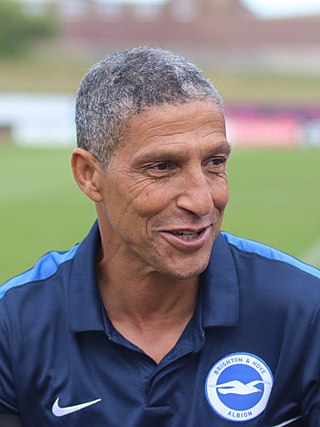
Christopher William Gerard Hughton is a professional football manager and former player. Born in England, he represented the Republic of Ireland national team. He was most recently head coach of the Ghana national team.
The 1982–83 season was the 103rd season of competitive football in England.
The 1981–82 season was the 102nd season of competitive football in England. It was also the first season that the three-points-for-a-win system was introduced.
The 1980–81 season was the 101st season of competitive football in England.
The 1979–80 season was the 100th season of competitive football in England.
Phil Beal is an English former footballer who played as a central defender.
The 1960–61 season was the 62nd completed season of The Football League.
The 1970–71 season was the 72nd completed season of The Football League.
The 1975–76 season was the 77th completed season of The Football League.
The 1976–77 season was the 78th completed season of The Football League.
The 1977–78 season was the 79th completed season of The Football League. The season began on 20 August 1977 and ended after 42 matches on 4 May 1978.
The 1980–81 season was the 82nd completed season of The Football League. This was the final league season with two points for win.
The 1986–87 season was the 88th completed season of The Football League.
The 1982–83 FA Cup was the 102nd season of the world's oldest football knockout competition, The Football Association Challenge Cup, or FA Cup for short. The competition was won by Manchester United, who drew the first final 2–2, but won the replay 4–0.
The 1992–93 season was the 87th season of competitive football played by Tottenham Hotspur. They competed in the inaugural season of the FA Premier League.
The 1980–81 season was Arsenal Football Club's 55th consecutive season in the top flight of English football. The club ended their campaign third in the Football League First Division, despite a dismal start. Manager Terry Neill was attempting to follow up on finalist performances in both the FA Cup and the European Cup Winner's Cup during the previous season.
The 1982–83 season was Arsenal Football Club's 57th consecutive season in the top flight of English Football, the Football League First Division. The club ended the season tenth, down from the fifth of the previous season, which had qualified them for the UEFA Cup. However, they went out first-round of the UEFA Cup and lost to Manchester United in the semifinals of both the FA Cup and League Cup.
The 1981–82 season was Arsenal Football Club's 56th consecutive season in the top flight of English football. The club ended their campaign fifth in the Football League First Division. After losing Liam Brady in 1980, Arsenal lost Frank Stapleton, Arsenal's 1980-81 top scorer, to Manchester United. Pat Rice also departed Arsenal for Watford and David O'Leary assumed the captaincy.
The 1979–80 season was Arsenal Football Club's 54th consecutive season in the Football League First Division. The club finished the season in fourth after struggling with scoring goals and a congested schedule at the end of the season.
The 1989–90 season was the 84th season of competitive football played by Tottenham Hotspur. Entering the 1989–90 season, Terry Venables stayed on as manager for his third season in charge of Tottenham with the team ending in third position, sixteen points behind eventual champions Liverpool. In the FA Cup, they got knocked out by fellow first division team, Southampton and they got knocked out in the quarter-finals of the Football League Cup by Nottingham Forest.
